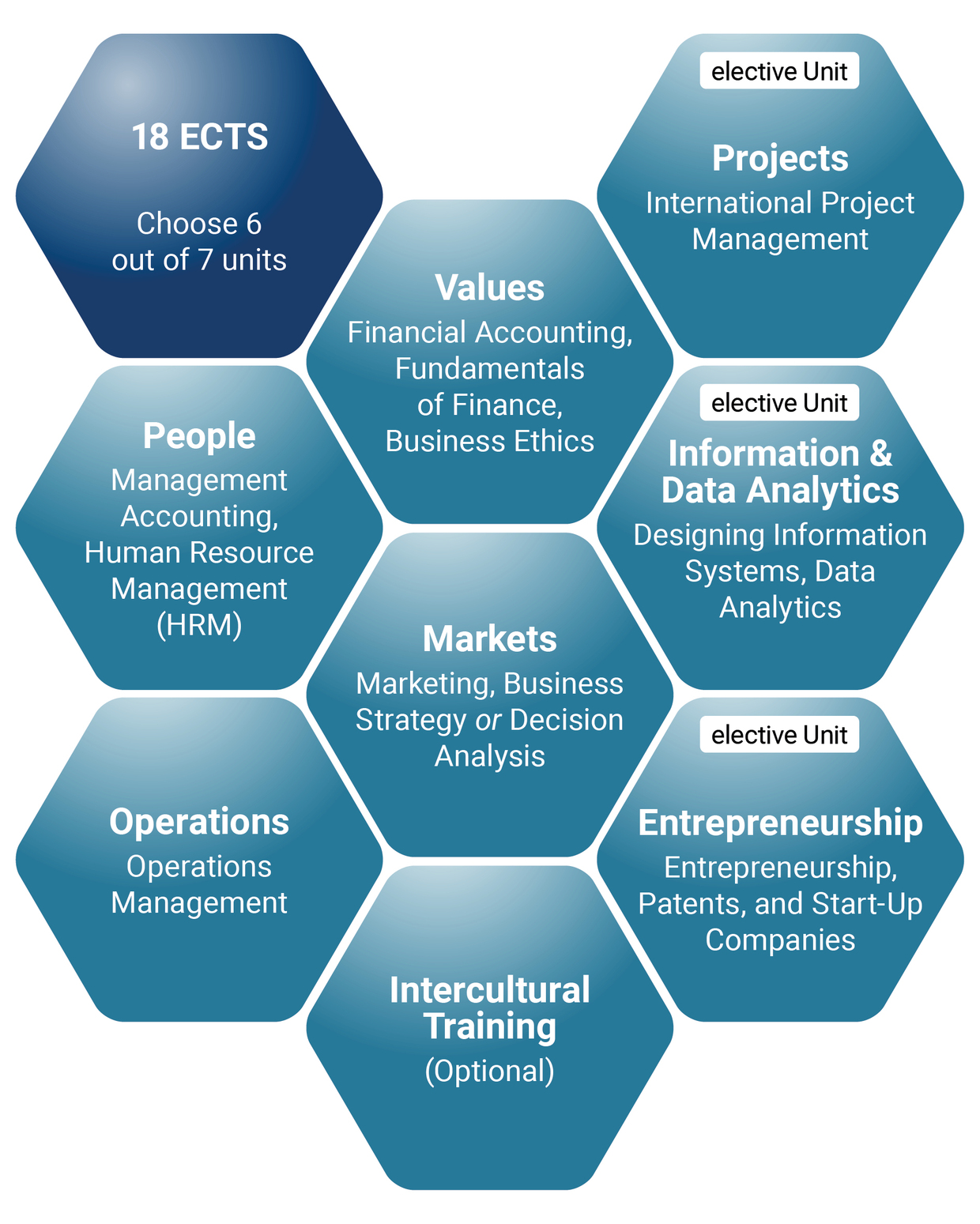In seven units, the MBA Fundamentals Program follows a research-oriented, non-consecutive approach regarding, e.g., human resource management, project and operations management. The completion of the MBA Fundamentals Program is worth 18 credit points (in the European Credit Transfer System, ECTS). These credit points are recognized in international MBA Programs.
Participants have the freedom to choose the order of units individually. Available for selection are six out of the seven units. The program can be completed during the doctoral research project or parallel to your job. After the successful completion of all units, the MBA Fundamentals Certificate is awarded by the Karlsruhe Institute of Technology (KIT).
Units 2024*
| Units | Dates | Format |
|---|---|---|
| Operations | May 13 - 17, 2024 | |
| Values | July 22 - 26, 2024 | This unit always takes place online. |
| Markets | September 16 - 20, 2024 | |
| People | February 26 - March 01, 2024 | This unit takes place online. |
| Information & Data Analytics | March 20 - 22, 2024 (part 1) & April 25 - 26, 2024 (part 2) |
This unit takes place online. |
| Entrepreneurship |
October 21 - 25, 2024 |
|
| Projects | June 17 - 21, 2024 | This unit always takes place online. |
*Dates can be subject to change.
Unit "Operations"
Unit "Operations"
Description
The Operations unit provides a general introduction to the operations of an industrial company in the context of Supply Chain Management. The unit covers the major processes occurring in production enterprises and downstream logistics networks. Additional content includes a general introduction to mathematical optimization, objectives and process models, market analysis and demand planning, production control, resource and asset planning, quality management, product design, and production programs, as well as product utilization and recycling.
USP = What’s in it for me?
Unveil the secrets of Operations Management to understand the challenges companies are facing nowadays i.e. in the context of Supply Chain Management.
Learning Results
Following the Operations unit, you will understand industrial engineering concepts and the analysis of production and logistics systems with the help of mathematical models for the operations in supply chain networks. You will be able to identify optimization potential in supply chain networks and solution-oriented approaches in the form of algorithms that require implementation in company-wide IT infrastructures. Understanding, identifying, and analyzing success factors and methods in advanced planning and optimization systems to improve business process efficiency will come more natural to you. You will understand information flows and decision points in the comprehensive planning of a company and will have acquired specific knowledge of cutting-edge scientific methods for the respective business modules.
Unit "Values"
Unit "Values"
Description
The Values unit explores the core elements of financial accounting, corporate finance, and business ethics. Businesses communicate their results and position to stakeholders with financial accounting. Managers use the language of financial accounting to make sound investment and financing decisions. The approach adopted in this unit will enable participants to make decisions based on financial criteria and understand how stakeholders are informed of these decisions. Participants will develop a deep understanding of the methods of accounting and finance while learning how to apply them in various business environments. Furthermore, the Values unit discusses and describes the foundations of ethical behavior in companies.
USP = What’s in it for me?
Hit the ground running with additional knowledge gained in Finance and Accounting, and Entrepreneurship: Both corporations and academic institutions expect their leaders to have a clear understanding of corporate metrics, accounting practices, financing, and ethical issues. Enhance your ability to communicate interdepartmentally as well as understand requirements set out by them for your work.
Learning Results
Upon completing the Values unit, you will possess a deeper knowledge of how to understand, interpret, and analyze the information provided by financial statements. Furthermore, you will be able to evaluate investment projects from a financial point of view as well as have acquired an understanding of the main principles of business finance. Additionally, you will learn how to affect change in an organization to best promote ethical behavior.
Unit "Markets"
Unit "Markets"
Marketing provides participants with an introduction to the fundamental aspects of marketing. After introducing the fundamentals, the course looks at three elements of the marketing mix in more detail: product management, pricing, and sales management. In each of these segments, select concepts will be introduced and applied to relevant case studies. Moreover, popular marketing tools from these content domains will be taught, for instance, conjoint analysis, cost-plus pricing, value pricing, and customer satisfaction measurement.
Course: Business Strategy
Business strategy starts by introducing the classic strategic management process (from a mission via objectives, analysis, to strategy formulation and implementation). For the remainder of the course, individual aspects of this strategy process are then analysed in more detail. This course in particular focuses on an external strategic analysis (e.g., market segmentation), internal strategic analysis (e.g., core competencies), business strategies (e.g., innovation strategies), and corporate strategies (e.g., the BCG matrix). In two case studies, participants learn how to apply select concepts to business problems.
Course: Decision Analysis
The objective of the Decision Analysis course is to teach the fundamentals of economic decision theory for uncertainty and risk, as well as the basic principles of game theory. The course is divided into two parts detailing the Expected Utility Theory (e.g. St. Petersburg Paradox, Independence Axiom, Allais Paradox, Risk Aversion) and Game Theory (e.g. Pure Strategies versus Mixed Strategies, Dominated Strategies, Nash Equilibrium).
USP = What’s in it for me?
Prepare for your future career as a strategic analyst. Marketing is key concept in all business areas and is of growing importance in academia. It is necessary to learn relevant aspects and strategies in the field of marketing as even quality products can fail if introduced improperly into the market. Learn how marketing decisions are made and how you can make the right decisions in any given situation.
Learning Results
Upon completing the Markets unit, you will be able to accurately analyze product management and pricing from a marketing perspective. You have fundamental knowledge in the central concepts of strategic management alongside the ideal-typical strategy process and the implementation of internal and external analyses. Furthermore, you will be able to develop advanced solution concepts for strategic decision situations and apply them to concrete economic-policy problems.
Unit "People"
Unit "People"
Description
The People unit deals with the current challenges of human resource management in organizations and companies. The economic analysis of the individual behavior and the individual performance in strategic situations is presented, as along with current empirical research on relevant issues of human resource management. Interactive classroom experiments add to the microeconomic approaches and demonstrate the limits of the traditional economic theory based on individual rationality. In the unit, participants monitor the theoretical approaches within the framework of case studies and examples from real ventures and thereby gain an understanding of the complex challenges and possibilities of the processes and practices in human resource management and leadership.
Additionally, the lecture on management accounting will address how managerial accounting is utilized as an instrument for planning and controlling the use of money within a company and how it helps owners, managers, and employees make decisions through budgeting.
USP = What’s in it for me?
You will have the ability to build and guide your team and get results on time. Learn more about Human Resource Management and Management Accounting to gain the required skills for your Postdoctoral leadership career.
Learning Results
Upon successful completion of the People unit, you will understand the central importance of costing for analyzing the efficiency of the organization with a particular focus on the influence of the costing system on the profitability of cost objects such as products, business units, or customers. You will know that Key Performance Indicators (KPIs) are an essential success factor for strategy implementation and monitoring and the importance of identifying stakeholder priorities for this process. After the unit, you will understand the problems of human resource management and their relationship to the structuring of organizations, as well as the relationship to business success and strategic situations in organizations, know different leadership methods and be able to apply them, and apply approaches to avoid and resolve conflict situations.
Unit "Projects" (Elective)
Description
Project management is a critical employee qualification in a global company. Participants of the HECTOR School MBA Fundamentals Program will hone their skills in project management in the Projects unit. This unit provides an introduction to project management that aims at developing the skills to initiate, plan and implement projects successfully. Participants obtain a deep understanding of the methods and skills required to succeed as a project manager in a complex business environment. The project management module covers the project life cycle and the complementary activities through the phases of a project. In this module, participants will learn how to use agile management approaches and how to implement them in the context of a project simulation. As part of the simulation, participants will experience how using agile project management tools and techniques increase the implementation speed significantly.
USP = What’s in it for me?
Define your research work using supporting project management tools. You will learn how to determine time and resource constraints to proceed in the most efficient manner possible. This will help you to maintain your peace of mind while conducting your research work and delivering your results on time.
Learning Results
After completing the Projects unit, you will possess comprehensive knowledge in the principles and various instruments of project management as well as having acquired the skill set to initiate, plan and implement projects.
Unit "Information & Data Analytics" (Elective)
Description
The primary objective of the unit is to enable participants to understand the importance of designing information systems from a socio-technical perspective. Participants will learn to play a vital role at the intersection of technology and business issues, understand the needs and requirements of various users, and thereby be able to bridge the gap between the company’s customers and end-users, Line-of-Business experts, and IT experts.
Sound decisions rely on competence in applying and interpreting data analytics techniques.
Participants will be instructed in a practical overview of data analysis methods, considering all three aspects of data analysis: descriptive, predictive, and prescriptive analysis. In the course, participants will apply these techniques using Python and learn to interpret results, limitations, and missing results in simple language.
USP = What’s in it for me?
Discover the hidden potential of Digital Transformation either within your spin-off or as part of a company´s digital transformation. Understanding the principles and techniques in Data Analytics and Information Systems Management will help participants to make better decisions as a leader either in academia or industry.
Learning Results
Upon completing the Information and Data Analytics unit, participants will have an overview of the different phases of the information systems lifecycle and understand key concepts and implications of information systems. Participants will additionally acquire competencies in applying and interpreting data analytics techniques and know methods and techniques to successfully design information systems with a human-centred approach.
Unit "Entrepreneurship" (Elective)
Description
Entrepreneurs change how we create value, work, and live. They drive innovative change, create jobs and wealth through new ventures, and contribute to a positive change in society and the global economy. One of the prominent forms of entrepreneurship is based on new technologies. The course will combine an introduction to the topic with an action learning setting to develop knowledge, skills, and attitudes of technology entrepreneurship.
USP = What’s in it for me?
Have a great research topic? Learn about the basic pillars of successful start-ups. Learn how to create your own technology-based company and learn how to let it grow, protect your ideas and start your journey into business opportunities.
Learning Results
Upon completion of the Entrepreneurship unit, you will have developed the competencies necessary for technology entrepreneurship. Furthermore, you will grasp the main theoretical concepts of entrepreneurship through first experiences with a project assignment – this assignment includes the cognitive, social, and personal experiences in the context of typical tasks of technology entrepreneurs.

Ms. Hanna Meinzer
Manager Operations
mba-fundamentals@
hectorschool.kit.edu
+49 721-608-45786









